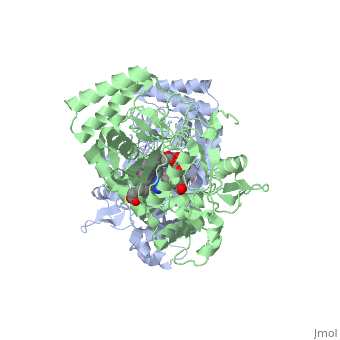2g6h
From Proteopedia
(Difference between revisions)
| (3 intermediate revisions not shown.) | |||
| Line 1: | Line 1: | ||
| + | |||
==Structure of rat nNOS heme domain (BH4 bound) in the reduced form== | ==Structure of rat nNOS heme domain (BH4 bound) in the reduced form== | ||
| - | <StructureSection load='2g6h' size='340' side='right' caption='[[2g6h]], [[Resolution|resolution]] 2.00Å' scene=''> | + | <StructureSection load='2g6h' size='340' side='right'caption='[[2g6h]], [[Resolution|resolution]] 2.00Å' scene=''> |
== Structural highlights == | == Structural highlights == | ||
| - | <table><tr><td colspan='2'>[[2g6h]] is a 2 chain structure with sequence from [ | + | <table><tr><td colspan='2'>[[2g6h]] is a 2 chain structure with sequence from [https://en.wikipedia.org/wiki/Rattus_norvegicus Rattus norvegicus]. Full crystallographic information is available from [http://oca.weizmann.ac.il/oca-bin/ocashort?id=2G6H OCA]. For a <b>guided tour on the structure components</b> use [https://proteopedia.org/fgij/fg.htm?mol=2G6H FirstGlance]. <br> |
| - | </td></tr><tr id='ligand'><td class="sblockLbl"><b>[[Ligand|Ligands:]]</b></td><td class="sblockDat"><scene name='pdbligand=ACT:ACETATE+ION'>ACT</scene>, <scene name='pdbligand=ARG:ARGININE'>ARG</scene>, <scene name='pdbligand=H4B:5,6,7,8-TETRAHYDROBIOPTERIN'>H4B</scene>, <scene name='pdbligand=HEM:PROTOPORPHYRIN+IX+CONTAINING+FE'>HEM</scene>, <scene name='pdbligand=ZN:ZINC+ION'>ZN</scene | + | </td></tr><tr id='method'><td class="sblockLbl"><b>[[Empirical_models|Method:]]</b></td><td class="sblockDat" id="methodDat">X-ray diffraction, [[Resolution|Resolution]] 2Å</td></tr> |
| - | + | <tr id='ligand'><td class="sblockLbl"><b>[[Ligand|Ligands:]]</b></td><td class="sblockDat" id="ligandDat"><scene name='pdbligand=ACT:ACETATE+ION'>ACT</scene>, <scene name='pdbligand=ARG:ARGININE'>ARG</scene>, <scene name='pdbligand=H4B:5,6,7,8-TETRAHYDROBIOPTERIN'>H4B</scene>, <scene name='pdbligand=HEM:PROTOPORPHYRIN+IX+CONTAINING+FE'>HEM</scene>, <scene name='pdbligand=ZN:ZINC+ION'>ZN</scene></td></tr> | |
| - | + | <tr id='resources'><td class="sblockLbl"><b>Resources:</b></td><td class="sblockDat"><span class='plainlinks'>[https://proteopedia.org/fgij/fg.htm?mol=2g6h FirstGlance], [http://oca.weizmann.ac.il/oca-bin/ocaids?id=2g6h OCA], [https://pdbe.org/2g6h PDBe], [https://www.rcsb.org/pdb/explore.do?structureId=2g6h RCSB], [https://www.ebi.ac.uk/pdbsum/2g6h PDBsum], [https://prosat.h-its.org/prosat/prosatexe?pdbcode=2g6h ProSAT]</span></td></tr> | |
| - | <tr id='resources'><td class="sblockLbl"><b>Resources:</b></td><td class="sblockDat"><span class='plainlinks'>[ | + | |
</table> | </table> | ||
== Function == | == Function == | ||
| - | [ | + | [https://www.uniprot.org/uniprot/NOS1_RAT NOS1_RAT] Produces nitric oxide (NO) which is a messenger molecule with diverse functions throughout the body. In the brain and peripheral nervous system, NO displays many properties of a neurotransmitter. Inhibitory transmitter for non-adrenergic and non-cholinergic nerves in the colorectum. Probably has nitrosylase activity and mediates cysteine S-nitrosylation of cytoplasmic target proteins such SRR. Inhibitory transmitter for non-adrenergic and non-cholinergic nerves in the colorectum. |
== Evolutionary Conservation == | == Evolutionary Conservation == | ||
[[Image:Consurf_key_small.gif|200px|right]] | [[Image:Consurf_key_small.gif|200px|right]] | ||
Check<jmol> | Check<jmol> | ||
<jmolCheckbox> | <jmolCheckbox> | ||
| - | <scriptWhenChecked>select protein; define ~consurf_to_do selected; consurf_initial_scene = true; script "/wiki/ConSurf/g6/2g6h_consurf.spt"</scriptWhenChecked> | + | <scriptWhenChecked>; select protein; define ~consurf_to_do selected; consurf_initial_scene = true; script "/wiki/ConSurf/g6/2g6h_consurf.spt"</scriptWhenChecked> |
<scriptWhenUnchecked>script /wiki/extensions/Proteopedia/spt/initialview01.spt</scriptWhenUnchecked> | <scriptWhenUnchecked>script /wiki/extensions/Proteopedia/spt/initialview01.spt</scriptWhenUnchecked> | ||
<text>to colour the structure by Evolutionary Conservation</text> | <text>to colour the structure by Evolutionary Conservation</text> | ||
</jmolCheckbox> | </jmolCheckbox> | ||
| - | </jmol>, as determined by [http://consurfdb.tau.ac.il/ ConSurfDB]. You may read the [[Conservation%2C_Evolutionary|explanation]] of the method and the full data available from [http://bental.tau.ac.il/new_ConSurfDB/ | + | </jmol>, as determined by [http://consurfdb.tau.ac.il/ ConSurfDB]. You may read the [[Conservation%2C_Evolutionary|explanation]] of the method and the full data available from [http://bental.tau.ac.il/new_ConSurfDB/main_output.php?pdb_ID=2g6h ConSurf]. |
<div style="clear:both"></div> | <div style="clear:both"></div> | ||
<div style="background-color:#fffaf0;"> | <div style="background-color:#fffaf0;"> | ||
| Line 32: | Line 32: | ||
==See Also== | ==See Also== | ||
*[[Nitric Oxide Synthase|Nitric Oxide Synthase]] | *[[Nitric Oxide Synthase|Nitric Oxide Synthase]] | ||
| + | *[[Nitric Oxide Synthase 3D structures|Nitric Oxide Synthase 3D structures]] | ||
== References == | == References == | ||
<references/> | <references/> | ||
__TOC__ | __TOC__ | ||
</StructureSection> | </StructureSection> | ||
| - | [[Category: | + | [[Category: Large Structures]] |
| - | [[Category: Igarashi | + | [[Category: Rattus norvegicus]] |
| - | [[Category: Jamal | + | [[Category: Igarashi J]] |
| - | [[Category: Li | + | [[Category: Jamal J]] |
| - | [[Category: Poulos | + | [[Category: Li H]] |
| - | [[Category: Yang | + | [[Category: Poulos TL]] |
| - | + | [[Category: Yang W]] | |
| - | + | ||
| - | + | ||
| - | + | ||
Current revision
Structure of rat nNOS heme domain (BH4 bound) in the reduced form
| |||||||||||
Categories: Large Structures | Rattus norvegicus | Igarashi J | Jamal J | Li H | Poulos TL | Yang W


